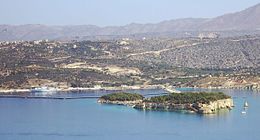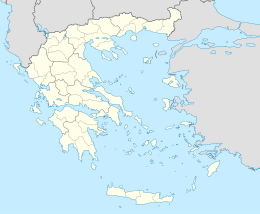Souda (Greek: Σούδα) is an islet in Souda Bay on the northwest coast of Crete. In ancient times this islet was one of two islets that were referred to as Leukai. The second islet is known today as Leon.
Native name: Σούδα | |
|---|---|
 The islet of Souda, to the right of a smaller islet called Leon, in Souda bay. | |
| Geography | |
| Coordinates | 35°29′20″N 24°09′07″E / 35.489°N 24.152°E |
| Archipelago | Cretan Islands |
| Administration | |
Greece | |
| Region | Crete |
| Regional unit | Chania |
| Demographics | |
| Population | 0 (2001) |
History
editThe island was fortified by the Venetians due to its strategic location, controlling the entrance to the anchorage of Souda Bay (which is still an important Greek and NATO naval base). Although the rest of Crete fell to Ottoman control in the Cretan War (1645–1669), the fortress of Souda (along with the island fortresses of Gramvousa and Spinalonga) remained in Venetian hands until 1715, when they too fell to the Ottomans. During this time, the island served as a refuge for Cretan insurgents.
Mythology
editOn the northwest side of the islet, a small distance away, there is another island which is almost round in shape, which used to be referred to on medieval Venetian maps as Rabbit Island (known as Nisi and Leon today). In ancient times these two islets were referred to as Leukai (Greek for "white ones"). Their name came from the ancient Greek myth about a musical contest between the Sirens and the Muses. Out of their anguish from losing the competition, writes Stephanus of Byzantium, the Muses plucked their rivals' feathers from their wings; the Sirens turned white and fell into the sea at Aptera ("wingless") where they formed the islands in the bay that were called Lefkai.[1]
See also
editReferences
edit- ^ Caroline M. Galt, "A marble fragment at Mount Holyoke College from the Cretan city of Aptera", Art and Archaeology 6 (1920:150).
